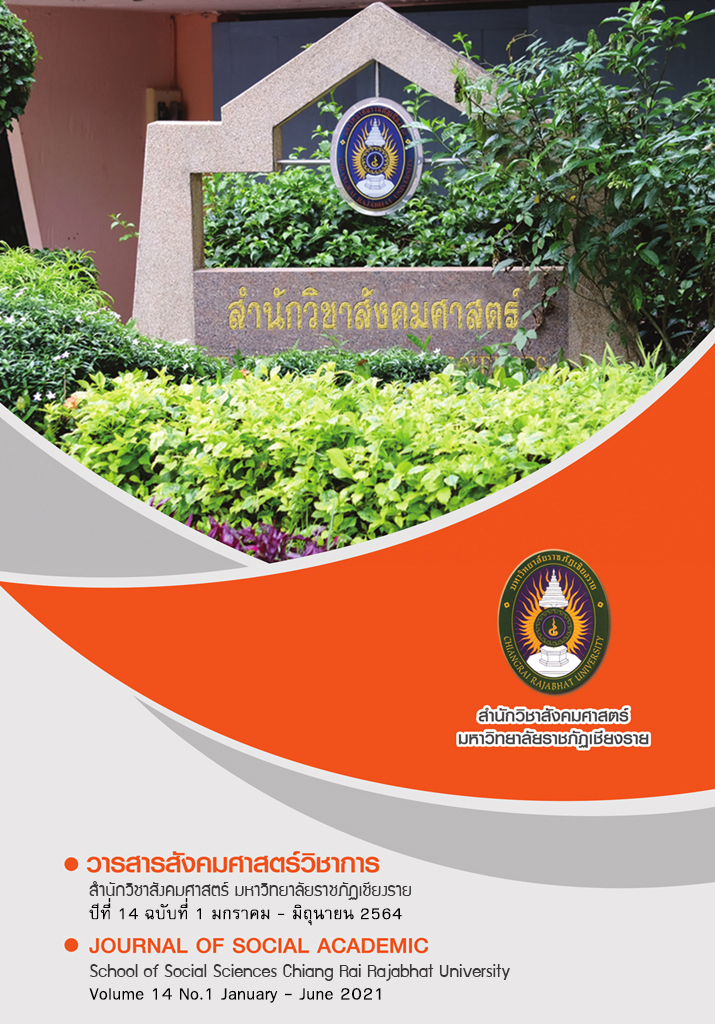A Study of Influences of the Research Ethic Affecting the Attitudes towards STEM Education
Main Article Content
บทคัดย่อ
The objectives of this study were to 1) examine the relationship between the research ethic and the attitudes towards STEM and 2) develop the equation of the attitudes towards STEM of undergraduate students of School of Education, University of Phayao. The samples consisted of 83 second-year students taught with STEM approach during semester two in academic year 2019. They were selected by using purposive sampling. The customized research instrument was the research ethic affecting the attitudes towards STEM test having content validity rated by the experts at 0.80. The data were analyzed by using descriptive statistics including mean, standard deviation, Pearson correlation coefficient and multiple regression analysis.
The relationship of variables between research ethic and attitudes towards STEM found no relationship when analyzing relationships among all variables affected attitudes towards STEM. It was revealed that r score was lower than .40 (r<.40) as a small relationship. Obviously, Research Questions (RE1), Research Design (RE3), Data Analysis (RE5) and Research Presentation (RE7) were at a statistically significant level in the same direction. On the contrary, Information Retrieval (RE2), Data Collection (RE4) and Conclusion (RE6) were in the opposite direction.
The findings of multiple regression analysis using stepwise regression to predict the attitudes towards STEM represented the correlation of the predictor variables of the research ethic and the attitudes towards STEM was statistically significant at 0.05 containing two variables, Information Retrieval (RE2) and Data Collection (RE4). They had the multiple correlation coefficient at 0.334 and could predict the attitudes towards STEM at 11.2%.
The prediction equation in raw score was ATTEN = 6.211Constant -3.229RE4 -0.953RE2 and the prediction equation result of the attitudes towards STEM in standard score was ZATTEN = -0.369RE4 -0.292RE2.
Article Details
รายละเอียดของลิขสิทธ์
เอกสารอ้างอิง
Garg, A., Madhulika and Passey, D. (2018). Research Skills Future in Education: Building Workforce Competence. Reserch report 1: Do we cultivate research skills? Varacity versus falsity. Department of Educational Reserch, Lancaster University.
Habineza, F. (2018). “An Exploratory Survey of Undergraduate Students’ Attitudes towards Research in Ines-Ruhengeri in Rwanda”, International Education Applied Scientific Research Journal, 3(3): 1-5.
Marchaim, U. (2001). “High-School Student Research at Migal Science Institute in Israel”, Journal of Biological Education, 35(4), 178-182.
Paitoon, S. (2014). Principle and Technique of Teaching for Higher Education (4th ed.). Bangkok: Chulalongkorn University Press.
Srikoon, S., Apaivatin, R., Monsaeng, P., Khamngoen, S. and Malaitao, T. (2020). “Construct Validity of Assessing Interest in STEM Content Scale”. Education Research International, 2020(1): 1-7.
Srikoon, S., Bunterm, T., Netthanomsak, T. and Ngang, T.K. (2016). “Construct Validity and Measurement Invariance of the Research Skill Inventory”. Mediterranean Journal of Social Sciences, 7(1): 366-377.
The Office of the Civil Service Commission. (2018). The Code of Ethics for the Authority Handbook. Retrieved from https://www.ocsc.go.th/node/4078. 16 January 2021.
Tisana, K. (2015). Science of Teaching Pedagogy. (15th edition). Bangkok: Chulalongkorn University Press.
Uten, P.and Sudawadee, L. (2016). The Research Methodology. https://sudawadeelim.wixsite.com /stat4you. 16 January 2021.
Vasquez, J.A., Sneider, C., and Comer, M. (2013). STEM Lesson Essentials: Integrating Science,Technology, Engineering, and Mathematics. Portsmouth, NH: Heinemann.
Vossen. T. E., Henze, I., Rippe, R.C., van Driel, J.H. and de Vries, M. J. (2018). “Attitudes of Secondary School Students towards Doing Research and Design Activity”, International Journal of Science Education, 40(13): 1629-1652.
Walliman, N. (2011). Research methods: The basics. New York: Routledge.
Wongnapa, K. and Nuntarat, K. (2018). The development of Students’ Creative Thinking Skill of Robot Club for Learning Using STEM Education Activity under the Topic of The Alternative Robot for the Future. Bangkok: Office of the Basic Education Commission: OBEC, Education Ministry of Thailand.


